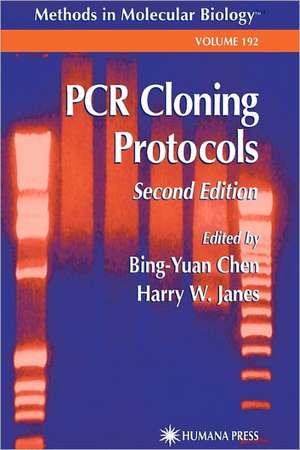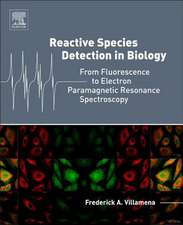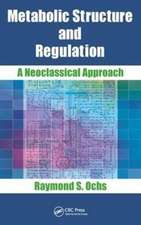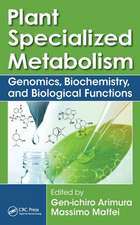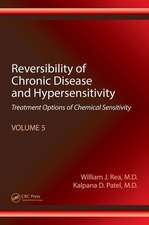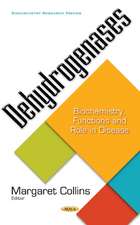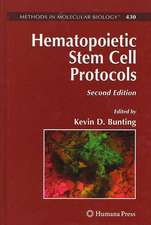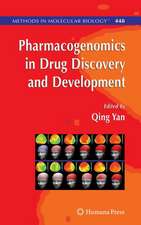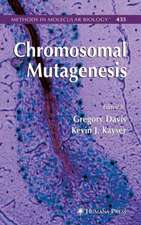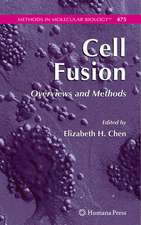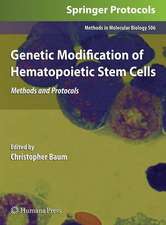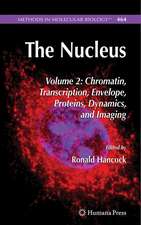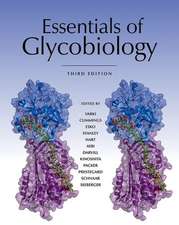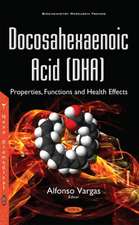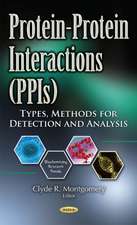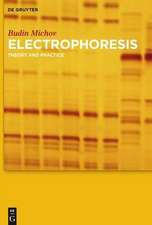PCR Cloning Protocols: Methods in Molecular Biology, cartea 192
Editat de Bing-Yuan Chen, Harry W. Janesen Limba Engleză Paperback – 10 noi 2010
| Toate formatele și edițiile | Preț | Express |
|---|---|---|
| Paperback (1) | 947.64 lei 43-57 zile | |
| Humana Press Inc. – 10 noi 2010 | 947.64 lei 43-57 zile | |
| Hardback (1) | 955.25 lei 43-57 zile | |
| Humana Press Inc. – apr 2002 | 955.25 lei 43-57 zile |
Din seria Methods in Molecular Biology
- 9%
 Preț: 791.59 lei
Preț: 791.59 lei - 23%
 Preț: 598.56 lei
Preț: 598.56 lei - 20%
 Preț: 882.95 lei
Preț: 882.95 lei -
 Preț: 252.04 lei
Preț: 252.04 lei - 5%
 Preț: 802.69 lei
Preț: 802.69 lei - 5%
 Preț: 729.61 lei
Preț: 729.61 lei - 5%
 Preț: 731.43 lei
Preț: 731.43 lei - 5%
 Preț: 741.30 lei
Preț: 741.30 lei - 5%
 Preț: 747.16 lei
Preț: 747.16 lei - 15%
 Preț: 663.45 lei
Preț: 663.45 lei - 18%
 Preț: 1025.34 lei
Preț: 1025.34 lei - 5%
 Preț: 734.57 lei
Preț: 734.57 lei - 18%
 Preț: 914.20 lei
Preț: 914.20 lei - 15%
 Preț: 664.61 lei
Preț: 664.61 lei - 15%
 Preț: 654.12 lei
Preț: 654.12 lei - 18%
 Preț: 1414.74 lei
Preț: 1414.74 lei - 5%
 Preț: 742.60 lei
Preț: 742.60 lei - 20%
 Preț: 821.63 lei
Preț: 821.63 lei - 18%
 Preț: 972.30 lei
Preț: 972.30 lei - 15%
 Preț: 660.49 lei
Preț: 660.49 lei - 5%
 Preț: 738.41 lei
Preț: 738.41 lei - 18%
 Preț: 984.92 lei
Preț: 984.92 lei - 5%
 Preț: 733.29 lei
Preț: 733.29 lei -
 Preț: 392.58 lei
Preț: 392.58 lei - 5%
 Preț: 746.26 lei
Preț: 746.26 lei - 18%
 Preț: 962.66 lei
Preț: 962.66 lei - 23%
 Preț: 860.21 lei
Preț: 860.21 lei - 15%
 Preț: 652.64 lei
Preț: 652.64 lei - 5%
 Preț: 1055.50 lei
Preț: 1055.50 lei - 23%
 Preț: 883.85 lei
Preț: 883.85 lei - 19%
 Preț: 491.88 lei
Preț: 491.88 lei - 5%
 Preț: 1038.84 lei
Preț: 1038.84 lei - 5%
 Preț: 524.15 lei
Preț: 524.15 lei - 18%
 Preț: 2122.34 lei
Preț: 2122.34 lei - 5%
 Preț: 1299.23 lei
Preț: 1299.23 lei - 5%
 Preț: 1339.10 lei
Preț: 1339.10 lei - 18%
 Preț: 1390.26 lei
Preț: 1390.26 lei - 18%
 Preț: 1395.63 lei
Preț: 1395.63 lei - 18%
 Preț: 1129.65 lei
Preț: 1129.65 lei - 18%
 Preț: 1408.26 lei
Preț: 1408.26 lei - 18%
 Preț: 1124.92 lei
Preț: 1124.92 lei - 18%
 Preț: 966.27 lei
Preț: 966.27 lei - 5%
 Preț: 1299.99 lei
Preț: 1299.99 lei - 5%
 Preț: 1108.51 lei
Preț: 1108.51 lei - 5%
 Preț: 983.72 lei
Preț: 983.72 lei - 5%
 Preț: 728.16 lei
Preț: 728.16 lei - 18%
 Preț: 1118.62 lei
Preț: 1118.62 lei - 18%
 Preț: 955.25 lei
Preț: 955.25 lei - 5%
 Preț: 1035.60 lei
Preț: 1035.60 lei - 18%
 Preț: 1400.35 lei
Preț: 1400.35 lei
Preț: 947.64 lei
Preț vechi: 1155.65 lei
-18% Nou
Puncte Express: 1421
Preț estimativ în valută:
181.33€ • 189.80$ • 150.92£
181.33€ • 189.80$ • 150.92£
Carte tipărită la comandă
Livrare economică 31 martie-14 aprilie
Preluare comenzi: 021 569.72.76
Specificații
ISBN-13: 9781617372810
ISBN-10: 1617372811
Pagini: 456
Ilustrații: XIV, 439 p.
Dimensiuni: 155 x 235 x 24 mm
Greutate: 0.66 kg
Ediția:Softcover reprint of hardcover 2nd ed. 2002
Editura: Humana Press Inc.
Colecția Humana
Seria Methods in Molecular Biology
Locul publicării:Totowa, NJ, United States
ISBN-10: 1617372811
Pagini: 456
Ilustrații: XIV, 439 p.
Dimensiuni: 155 x 235 x 24 mm
Greutate: 0.66 kg
Ediția:Softcover reprint of hardcover 2nd ed. 2002
Editura: Humana Press Inc.
Colecția Humana
Seria Methods in Molecular Biology
Locul publicării:Totowa, NJ, United States
Public țintă
ResearchCuprins
Performing and Optimizing PCR.- Polymerase Chain Reaction.- Computer Programs for PCR Primer Design and Analysis.- Single-Step PCR Optimization Using Touchdown and Stepdown PCR Programming.- XL PCR Amplification of Long Targets from Genomic DNA.- Coupled One-Step Reverse Transcription and Polymerase Chain Reaction Procedure for Cloning Large cDNA Fragments.- Long Distance Reverse-Transcription PCR.- Increasing PCR Sensitivity for Amplification from Paraffin-Embedded Tissues.- GC-Rich Template Amplification by Inverse PCR.- PCR Procedure for the Isolation of Trinucleotide Repeats.- Methylation-Specific PCR.- Direct Cloning of Full-Length Cell Differentially Expressed Genes by Multiple Rounds of Subtractive Hybridization Based on Long-Distance PCR and Magnetic Beads.- Cloning PCR Products.- Cloning PCR Products.- Using T4 DNA Polymerase to Generate Clonable PCR Products.- Enzyme-Free Cloning of PCR Products and Fusion Protein Expression.- Directional Restriction Site-Free Insertion of PCR Products into Vectors.- Autosticky PCR.- A Rapid and Simple Procedure for Direct Cloning of PCR Products into Baculoviruses.- Mutagenesis and Recombination.- PCR Approaches to DNA Mutagenesis and Recombination.- In-Frame Cloning of Synthetic Genes Using PCR Inserts.- Megaprimer PCR.- PCR-Mediated Recombination.- PCR Method for Generating Multiple Mutations at Adjacent Sites.- A Fast Polymerase Chain Reaction-Mediated Strategy for Introducing Repeat Expansions into CAG-Repeat Containing Genes.- PCR Screening in Signature-Tagged Mutagenesis of Essential Genes.- Staggered Extension Process (StEP) In Vitro Recombination.- Random Mutagenesis by Whole-Plasmid PCR Amplification.- Cloning Unknown Neighboring DNA.- PCR-Based Strategies to Clone Unknown DNA Regions from Known Foreign Integrants.-Long Distance Vectorette PCR (LDV PCR).- Nonspecific, Nested Suppression PCR Method for Isolation of Unknown Flanking DNA (“Cold-Start Method”).- Inverse PCR.- 31 Inverse PCR.- Gene Cloning and Expression Profiling by Rapid Amplification of Gene Inserts with Universal Vector Primers.- The Isolation of DNA Sequences Flanking Tn5 Transposon Insertions by Inverse PCR.- Rapid Amplification of Genomic DNA Sequences Tagged by Insertional Mutagenesis.- Isolation of Large-Terminal Sequences of BAC Inserts Based on Double-Restriction-Enzyme Digestion Followed by Anchored PCR.- A #x201C;Step Down#x201D; PCR-Based Technique for Walking Into and the Subsequent Direct-Sequence Analysis of Flanking Genomic DNA.- Library Construction and Screening.- Use of PCR in Library Screening.- Cloning of Homologous Genes by Gene-Capture PCR.- Rapid and Nonradioactive Screening of Recombinant Libraries by PCR.- Rapid cDNA Cloning by PCR Screening (RC-PCR).- Generation and PCR Screening of Bacteriophage ? Sublibraries Enriched for Rare Clones (the “Sublibrary Method ”).- PCR-Based Screening for Bacterial Artificial Chromosome Libraries.- A 384-Well Microtiter-Plate-Based Template Preparation and Sequencing Method.- A Microtiter-Plate-Based High Throughput PCR Product Purification Method.
Recenzii
"This hardcover book is packed full of detailed protocols and methodological articles on various aspects of PCR. The fact that the book was taken out of my hands by a colleague, to read up on touch-down PCR, as soon as I received it for review, attest to the book's usefulness. I will have to chain this book to my bookshelf, to make sure it does not disappear quickly-or I may consider buying a couple for the laboratory." -Plant Science
Review of the first edition.
This volume provides protocols useful to both the inexperienced and the experienced investigator. Most importantly it highlights the emerging role of PCR as a versatile tool for the molecular biologist eliminating many laborious and expensive techniques associated with traditional gene isolation and analysis.-Biochemical Education
Review of the first edition.
This volume provides protocols useful to both the inexperienced and the experienced investigator. Most importantly it highlights the emerging role of PCR as a versatile tool for the molecular biologist eliminating many laborious and expensive techniques associated with traditional gene isolation and analysis.-Biochemical Education
Textul de pe ultima copertă
In the post-genomic era, PCR has become the method of choice not only for cloning existing genes, but also for generating a wide array of novel genes by mutagenesis and/or recombination within the genes of interest. PCR Cloning Protocols, Second Edition, updates and expands Bruce White's best-selling PCR Cloning Protocols (1997) with the newest procedures for DNA cloning and mutagenesis. Here the researcher will find readily reproducible methods for all the major aspects of PCR use, including PCR optimization, computer programs for PCR primer design and analysis, and novel variations for cloning genes of special characteristics or origin, with emphasis on long-distance PCR and GC-rich template amplification. Also included are both conventional and novel enzyme-free and restriction site-free procedures to clone PCR products into a range of vectors, as well as state-of-the-art protocols to facilitate DNA mutagenesis and recombination and to clone the challenging uncharacterized DNA flanking a known DNA fragment. Powerful applications of PCR in library construction and sublibrary generation and screening are also presented.
Authoritative and up-to-date, PCR Cloning Protocols, Second Edition, constitutes a gold-standard collection of the fastest, simplest, and most popular methods for isolating genes from all biological samples and creating novel genes from them by mutagenesis/recombination-essential methods for today's study of functional genomics, gene expression, protein structure-function relationships, protein engineering, and molecular evolution.
Authoritative and up-to-date, PCR Cloning Protocols, Second Edition, constitutes a gold-standard collection of the fastest, simplest, and most popular methods for isolating genes from all biological samples and creating novel genes from them by mutagenesis/recombination-essential methods for today's study of functional genomics, gene expression, protein structure-function relationships, protein engineering, and molecular evolution.
Caracteristici
Includes supplementary material: sn.pub/extras
